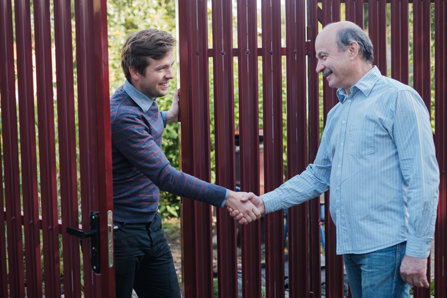After Rehab, How Should You Address Damaged Relationships and Community Harm?

You’ve graduated from rehab. Congratulations! You stuck with it and you dedicated yourself to your sobriety! What’s next?
Most people finishing rehab return to their home areas and get themselves re-established. Maybe they live with brothers, sisters or parents during this time, or maybe they had a home with spouse and children to return to. But these relationships you left behind when you left for rehab may not all be sunny and bright when you arrive back home. Your family and friends may harbor justified grudges based on the damage you did while you were addicted.
You may also have harmed your standing in the community. Maybe you stole valuables from neighbors, or the police arrested you multiple times. You may get some hard looks from members of your community when they see you the first time after rehab.
How should you address all these damaged relationships? Should you sit down with people and tell them all about your rehab? Should you try to convince people that you’ve changed? Let’s take a look at what steps are likely to be the most effective.
What to Expect When You Return Home
If your rehab was effective, you’re probably returning home feeling relieved and hopeful. Just realize that you might have a way to go before people in your community and family feel the same way about you. However, if you expect there to be some friction and you have a plan to overcome it, this will help you not be knocked sideways by any negative emotion you might encounter.

In fact, the best rehabilitation programs work with those about to return home to put together a transitional plan. You have enough to do to get yourself set up in life again without having to make a plan on the fly after you arrive home. A thorough transitional plan that takes into account all the major steps of establishing a new, sober existence is a must. It’s best if this is written down with the guidance of rehab staff that have experience and know what your re-entry to your post-rehab life is going to be like.
That plan should include how you’re going to address the damaged relationships you left behind, especially the ones most critical to your future success. Spouse, children, employer, best friends—considering how these people might feel about you and planning a resolution to any difficulties ahead of time can keep you from being blindsided by someone’s emotional outburst later on.
To ease your re-entry, here are some ways you can repair these damaged relationships. Expect it to take some time and some honest work on your part. But almost anyone can repair negative impressions other people have of them if they are patient and work at it.
- As soon as you contact your friends and family, don’t start out by making a lot of promises. Why? Because you have probably already made a hundred promises, and then broke them. Practice gratitude and healthy humility while re-establishing yourself in these people’s lives.
- Hopefully, your graduation from rehab included making a definite plan on the steps you needed to take to get set up in life again. If your rehab didn’t have you make such a plan, write one out before you do anything else. Do you need to find a job? Go back to school? Get some safe, permanent housing? Write out your plan in detail, preferably while you are feeling bright and upbeat. This plan will guide you as you start each day and can help focus you if you are feeling distracted or upset. If you did create a plan before leaving rehab, make sure it is out where you can see it, first thing every morning. And review it every morning to determine the best way to spend your time that day.
- Start re-establishing yourself by addressing the most essential basics first. If you have a job waiting for you, go back to work. If you need to find a job, start looking. If you need to go back to school, start working out how you’re going to make it happen. Start these actions on Day One. Don’t give yourself any wiggle room at all because that could allow unproductive thought patterns to creep in. This isn’t time for a vacation, no matter how hard you feel like you worked while at rehab.
- Wherever you’re staying while you’re getting rolling on #3, is it neat and clean? Are your possessions kept neatly? It doesn’t have to be a fancy place, but it should be someplace you can take at least a little pride in. While getting your basic necessities handled, take a little time and get out some soap, rags and sponges and start cleaning up. Fold your clothes neatly. Get rid of anything useless or broken. Definitely trash anything remotely related to drug or alcohol use.
- Next, start contributing to others. Did you steal money or valuables from your family? Start rebuilding those relationships a little at a time. Ask if you can mow the lawn, pressure wash the deck, wash the upstairs windows, weed the garden, clean out the garage. Can you help your grandmother with laundry or washing her car? If you have kids, do any of their toys or items of furniture need to be repaired? Don’t ask for payment. Don’t brag about how useful you are. Just keep practicing gratitude and healthy humility.
- As soon as you can, look for ways to help other people in your community without asking for anything in return. Volunteer. Show up at an anti-drug street fair and hand out brochures. Ask a church near you if they need anything. Maybe they have a sick parishioner who needs help. Visit a convalescent facility and ask if you can read to residents who don’t see so well anymore. Can you do construction? Find out if there is a Habitat for Humanity project near you. If you’re not sure where you can volunteer, go to the nearest public library and ask the person at the reference desk to help you find opportunities. That’s what librarians are there for, to help members of the community find the information they need. They can probably direct you to dozens of opportunities within your community.
- DON’T LET UP. You are not only rebuilding your relationships with every good deed you do, but you are also rebuilding your own soul. Yes, you started the process and made good progress while you were in rehab, but the bad you left behind is quite willing to creep in if you let it. So don’t let it. Accumulate good works every single day.
- With those people closest to you, stay honest, even when you made a mistake or were unkind. Every time you honestly admit your mistakes, you wash your soul clean.
Building Healthy Habits

If you maintain these actions until they become habits, you’re going to see people’s attitudes toward you begin to shift. People will begin to look you straight in the eye with greater respect. A few people may begin to comment on your improvement or thank you for your actions or honesty. Keep practicing gratitude and healthy humility.
You’re going to see something else change, too. Your own self-respect and feeling of worth are going to grow right along with every good action you take to establish an honest life or help someone else. As long as you keep these healthy habits going, you’ll have the upper hand when it comes to temptation.
Don’t Be Afraid to Ask for Help
If you have graduated from a good quality rehab, there should be someone from the team of people who supported you during your program that you can reach out to for support. What if a relationship you thought was going to be fine is actually a bubbling cauldron of anger? What if the job or educational plan you had fizzles out? You need someone you can talk to and the rehab staff know you and can advise you. Don’t be afraid to reach out. In a best-case scenario, there is a person appointed to support graduates after they go home.
Here’s a key to success after rehab: When you consistently prove your honesty and willingness to help, day after day and month after month, attitudes toward you will change. You won’t even have to say anything. But bear this in mind: There might be one or two or even three people who will never change their minds about you. You might not be able to make everyone happy. Some people are hiding pain of their own and can’t change their own minds. Try to be kind and tolerant if you find your paths crossing with a person like this. And focus your positive energy toward those people you have been able to help who appreciate it and appreciate you.
I wish you all the best. It’s not an easy road, but you’re already through the worst and on your way back to honest, productive living.
Sources:
- https://www.samhsa.gov/find-help/recovery
- https://www.narconon.org/drug-abuse/
- https://www.narconon.org/blog/what-can-you-do-to-build-a-better-world-in-recovery.html
- https://www.narconon.org/drug-rehab/skills/tolerance.html
- https://www.narconon.org/drug-rehab/relapse-factors/problems.html


 ®
®